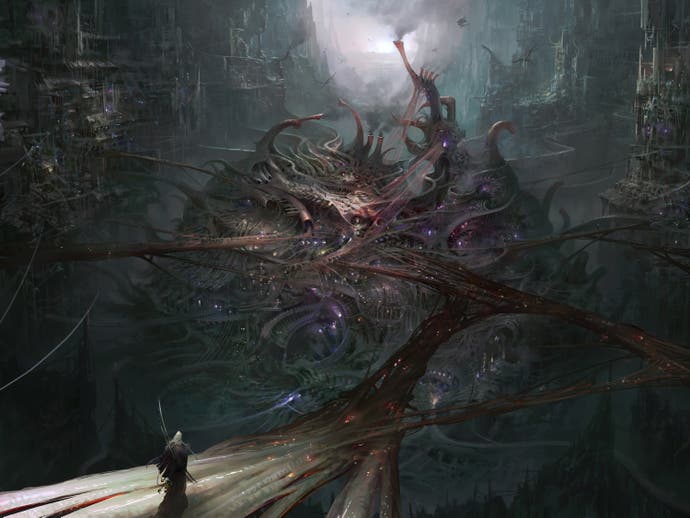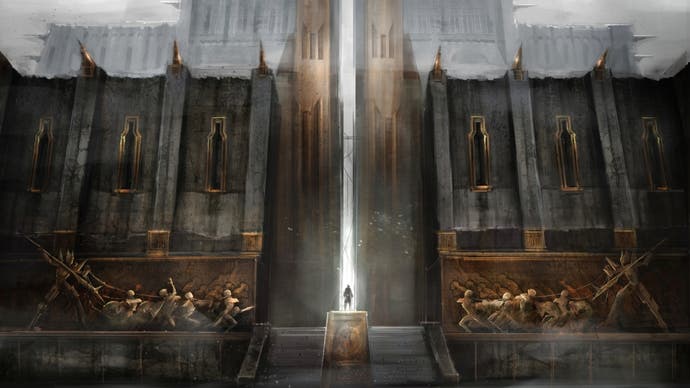Five of the Best: Cities
Metrovania.
Five of the Best is a weekly series about the bits of games we overlook. I'm talking about potions, hubs, bags, mountains, anything really - but things we ignore at the time. Then, years later, we find they're cemented in our memory, inseparable from our experience of the game. Turns out they were important after all. So now we're celebrating them.
Five of the Best works like this. Various Eurogamer writers will share their memories in the article and then you - probably outraged we didn't include the thing you're thinking of - can share the thing you're thinking of in the comments below. We've had some great discussions in our other Five of the Best pieces. Some of you have memories like elephants!
Today's Five of the Best...
Cities - it's a tricky one. Not because there aren't any good cities in games but because there are so many, and they're all big and they're all beautiful. Those Hollywood facades of yesteryear seem like a thing of the past. These days, we get cities like Novigrad where you can seemingly enter any building you run past. It's, frankly, frightening (especially for the people inside).
There are so many iconic cities: Rapture, City17, Midgar, anything Grand Theft Auto, most things Elder Scrolls, and then there's Dunwall and Yharnam, and the Citadel. But I'm not going to mention any of those - in the list, I mean, because I obviously just mentioned them - and I know this will rankle with you. It's not because they're bad - far from it. They're all brilliant. But they're known quantities. They've had their plaudits. I'm looking for the cities around the peripheries, the cities doing interesting things. They might not match the technical achievements of the others but they're memorable for other reasons.
So let's have at it! Here are five of the best cities. I hope it takes your mind off other things. I'll see you in the comments below.
Kirkwall (Dragon Age 2)
See, I told you you'd be outraged, but look, if you excuse the overall state of Dragon Age 2, it had a very interesting premise. It was a game about one place, Kirkwall, and your effect upon it. "Aren't all RPGs about that?" Yes, but most RPGs take place at one point in time, over days, weeks, sometimes months, and only show you consequences in the immediate aftermath. Dragon Age 2 took place over several years. It meant you could witness, firsthand, the consequences of actions. It was fascinating.
Each time the game lurched forwards a few years, Kirkwall would change, and because you knew the city, you knew the difference - you cared. It's such a brave design decision to decline a geographically sprawling adventure, as is the fantasy template, to focus on one place, one city, instead. Or was it a decision born from the sheer necessity of BioWare needing to ship a new RPG in 18 months? I prefer to think it was the former. Regardless, I love it. I wish more games would follow suit.
New York (Ghostbusters)
New York's been in loads of games, but in a way it's never been more vivid to me than it was in Ghostbusters, the David Crane game for the Commodore 64, in which you ran a Ghostbusting franchise and the city was the place where you did business.
New York! It was just a grid here, a series of boxes with streets and avenues carving them up neatly. You would sit and look at the city and wait for a ghost to be reported in a certain city block, then you would try and rush there before it disappeared in order to make your money.
The abstraction of it left the whole thing feeling very real. New York, when I played, was in my mind rather than on the screen. I was young, so it was all very vivid, filled with extreme and incorrect details. And this is the way New York should be, I think. It's the way it still is, long after I've actually gotten to know the real place.
-Christian Donlan
The Bloom (Torment: Tides of Numenera)
The Bloom is alive. It's a massive great blobby tendrilly thing people thought they'd build a city on, because that's obviously what you'd do, isn't it? The Bloom moves, only a few inches each year, and it has tendrils which reach into other dimensions. It's this gigantic enigma no one in the world really understands.
But that's not the best bit. The best bit is the Bloom feeds on the people who inhabit it - feeds on their thoughts, their minds, and sometimes - omp! - their bodies. There's not much they can do about it. One day a fangy maw appears and they're gone.
Thing is, people will never leave the Bloom because they need it and the riches, and possible pathways, to new lucrative new worlds it dangles before them. And the Bloom hopes they never leave either. It's a gruesomely symbiotic relationship - fly and flytrap.
You explore the Bloom in Torment: Tides of Numenera, and it's horridly brilliant, all fleshy and twisted - exactly the kind of place I hoped Torment would take me. And you explore all parts of it, even the heart, learning the deepest, darkest secrets of an unfathomable thing. It's tremendously awesome.

New London (Frostpunk)
[Edit: I am an idiot and did in fact mean New London, not Winterhome!]
I really wanted to feature a city you, the player, built. For me, Frostpunk's New London is it. It's the last city on earth, the only hope people have of surviving the cold. It's just a heat generator to begin with, one that needs stocking up with coal so you can turn it on. Then you build a ring of tent homes around it to keep your people warm, then you set about finding them food and then medical care and so on and so on until you expand outwards and research upwards. But resources run out and the temperature drops.
The pressure never relents in Frostpunk and it's in this moment, when you're sweating, the game probes at your moral fibre. All those laws you staunchly declared you would never pass - things like child labour or eating the dead (for real!) - suddenly look attractive. What's the alternative - death? Many little decisions which lead you down a dangerous road to regime you never thought you'd implement. You may not want to but there's an even bigger storm coming and you either do what it takes, or die. How far are you willing to go?
Metropolis (Superman Returns)
Predictable, isn't he, Superman? Always coming back. Sure you're gone - see you soon! The thing about Superman is he's a bit boring. He's boring because he's invincible. I'm afraid a chunk of green rock as a weakness doesn't quite cut it.
Being an invincible character in a game removes any semblance of challenge from it - God mode is only fun for so long. But Superman Returns came up with a way of dealing with this, and it's rather good - and it involves a city. Instead of Superman having a health bar, Metropolis had a health bar, and if it reached zero, game over. Finally, a way to make Superman fallible that's in-keeping with the theme of character too. Pity the city is empty and a bit rubbish. I'd just let it burn, Superman.





